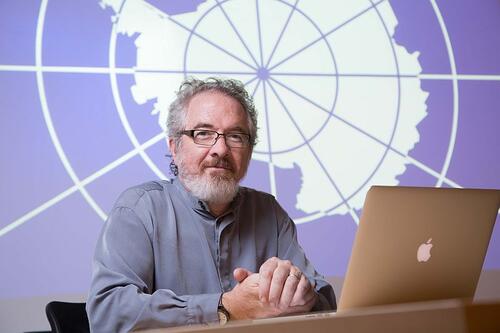
Glenn McClure
SUNY Geneseo faculty member Glenn McClure has completed a new choral work that the European Space Operations Center Chorus will perform in Darmstadt, Germany, June 28 to celebrate the center’s successful comet landing last November. The work is also in celebration of 25th anniversary of the chorus.
McClure’s piece, titled “Rosetta,” is written for mixed choir, piano and percussion and employs an excerpt from the original Rosetta Stone as well as incorporating the sounds that were recorded by the comet lander, created by oscillations in the comet’s magnetic field. The ESA's robotic space probe sent to explore the comet is named Rosetta, which carried the lander module, named Philae. The lander module landed near a cliff or crater and quickly lost power without sunlight but recently revived as the comet got closer to the sun and has resumed sending data for further analysis.
“I am celebrating with the scientific community that Philae has awakened in time for our concert,” said McClure. “I am looking forward to helping the ESA musically celebrate this amazing accomplishment and the longevity of the ESOC chorus.”
The chorus, under the direction of James Schar, comprises scientists, mathematicians and support staff at the European Space Agency’s main mission control center (equivalent to NASA’s Houston facility). McClure has had an enduring relationship with the chorus over the years resulting in his involvement with the celebration.
McClure worked with SUNY Geneseo planetary geologist Nicholas Warner on the new musical piece. Warner, assistant professor of geological sciences, worked closely with the ESA on the Mars Express mission and also is working with NASA characterizing Mars landing sites for future missions. With Warner’s help, McClure used a mathematical equation to translate data sets from ESA into melodies, harmonies and rhythms.
While this is the first time McClure has been commissioned by the ESA, it is not the first time he has applied his creative work to space themes. In collaboration with bestselling author Dava Sobel, he composed an oratorio based upon the letters of Galileo’s daughter, Maria Celeste, titled “The Starry Messenger.” The composition brought together a diverse team of musicians, dancers, scientists, scholars, teachers and K12 students that explored the musical influences of Galileo’s family.
Schar’s June concert in Darmstadt also includes the German premiere of “The Starry Messenger.”
McClure is on the faculties of SUNY Geneseo and the Eastman School of Music. His works are published by Roger Dean (Lorenz Group) and Earthsongs.